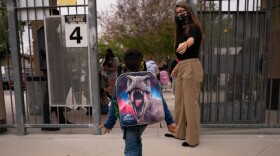GLORIA PENNER (Host): Nurses at five University of California hospitals are concerned about staffing levels that they consider unsafe and they are threatening to go on strike. KPBS Health Reporter Kenny Goldberg joins us now to discuss this story. Kenny why are the nurses concerned about the staffing levels at these hospitals?
GOLDBERG (KPBS Health Reporter): Well California has strict nurse to patient ratios in all hospital units. Nurses can never take care of more than five patients at a time in a regular unit. And in intensive care units for example, they can only take care of two patients at a time. And what nurses are saying, is when they go on breaks or when they have meal breaks, there’s not enough nurses to take care of the other patients, so that their colleagues have to double up on patients, have to provide relief for them in an ad-hoc way, while they go on a break – which is just not right.
PENNER: And it probably makes it less safe for the patients I would assume?
GOLDBERG: That’s what nurses say. Now the administrators say we have charge nurses and other supervisory nurses that can sort of can cover while you’re gone or while they’re on breaks, and therefore we are in compliance with the ratio laws. That’s their argument.
PENNER: So what do they hope to accomplish by going on strike?
GOLDBERG: Well, to show the UC system that they’re serious about it. What’s interesting about this labor dispute is that it’s not about money. They’re not arguing over money. They’ve already settled that whole issue. But it’s about working conditions that nurses claim are really unsafe and puts them under a lot of pressure. They feel responsible for their patients. So they want to be able to take their breaks and not have to worry about it, not have to sit with their pager looking as they’re eating their hamburger or something and be called right back into the patient room. So that’s really the issue.
PENNER: But now there’s a restraining order on those nurses and they cannot go on strike. So what reason did the judge give for doing that?
GOLDBERG: The judge agreed with the UC system that says it’s a public health threat if all the nurses walk out for a day. Now, both sides are headed back to court next Friday, at which point they’ll haggle out all the legal arguments. There’s also a no strike clause in the in the nurse’s labor agreement. But the nurse’s say it’s suspended when they reached a contract impasse, which they have. And also they’re saying, when there’s patient safety issues they should be allowed to go on strike – because they’re striking over patient safety issue.
PENNER: And they’re striking to call attention to it, so that the public might put some pressure on as well – is that part of it?
GOLDBERG: That’s right. That’s exactly right.
PENNER: So, is there a chance then that the nurses could still strike after that hearing next Friday?
GOLDBERG: Obviously, it depends on what the judge says. They want to have that option in their toolbox if they’re allowed to, so that they can exert that kind of pressure on the system. Because otherwise what can they do?
PENNER: So what happens to the patients in the hospital if they do strike?
GOLDBERG: That’s a very good question. Well I guess the supervisors would have to get in there and work on the floor. They’d have to hire a lot of traveling nurses. But we’re only talking about one day. They’re not going to walk out for a month or anything like that.
PENNER: How many nurses are we actually talking about though?
GOLDBERG: Well, in San Diego, about 1200 nurses would walk out. Statewide – over 11,000 – so that’s a lot of people.
PENNER: It is. And a lot of patients. Ok well we will keep an eye on this. We should know more after the hearing?
GOLDBERG: That’s right.
PENNER: Thank you very much Kenny Goldberg.
GOLDBERG: Thank you.








